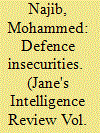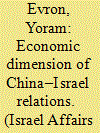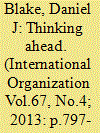| Srl | Item |
| 1 |
ID:
171570


|
|
|
| 2 |
ID:
154497


|
|
|
|
|
| Summary/Abstract |
Exploring Sino-Israeli economic relations comprehensively for the first time, this article suggests that this connection allowed the two states to overcome the defence crises that the relationship experienced in the early 2000s. After 2010, as China resolved to enhance relations with Israel, economic ties continued to fulfil a prominent role. Nevertheless, achievements have been mixed. Apparently, investments of Chinese firms in Israel and construction of infrastructure projects in Israel by Chinese corporations are the most successful activities, but they arouse mixed responses in Israel and may have political implications yet to be clarified.
|
|
|
|
|
|
|
|
|
|
|
|
|
|
|
|
| 3 |
ID:
099413


|
|
|
|
|
| Publication |
Washington, DC, World Bank, 2010.
|
| Description |
vii, 315p.
|
| Standard Number |
9780821382295
|
|
|
|
|
|
|
|
|
|
|
|
Copies: C:1/I:0,R:0,Q:0
Circulation
| Accession# | Call# | Current Location | Status | Policy | Location |
| 055320 | 336.3435091724/WOR 055320 | Main | On Shelf | General | |
|
|
|
|
| 4 |
ID:
124394


|
|
|
|
|
| Publication |
2013.
|
| Summary/Abstract |
International institutions help governments make credible commitments to other state and nonstate actors by raising the costs of commitment violation. However, in doing so these institutions generate sovereignty costs for national governments by constraining the autonomy they have to develop and implement policy. Governments respond to this trade-off between the credibility of commitments and policy autonomy differently depending on their time horizons and this shapes their preferences over the design of credibility-enhancing institutions. Governments with long time horizons expect to govern in the future, anticipate that conditions may shift over time, and therefore seek institutional designs that will afford them greater freedom to modify policies in response to changing economic and political conditions. Governments with shorter time horizons, on the other hand, do not anticipate being in power long into the future and therefore are less concerned about maintaining greater room to manipulate policy. I develop this argument in the context of bilateral investment treaties (BITs), focusing in particular on the legalization of obligation in national treatment commitments. I test the argument using an original data set of the design of national treatment obligations in a random sample of 342 BITs. I find that net importers of FDI with longer time horizons are more likely to build in greater policy autonomy in their BITs by scaling back the legalization of their national treatment obligations and that this relationship is robust to controlling for selection into investment treaties.
|
|
|
|
|
|
|
|
|
|
|
|
|
|
|
|